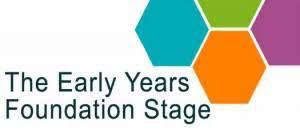 The Early Years Foundation Stage (EYFS) The Early Years Foundation Stage (EYFS)
The
Early Years Foundation Stage (EYFS) brings together:
-
Curriculum Guidance for the Foundation Stage (2000)
-
The Birth to Three Matters (2002)
-
Framework and the National Standards for Under 8s Daycare and Childminding (2003)
Building a coherent and flexible approach to care and learning.
All providers are required to use the EYFS to ensure that whatever setting parents choose, they can be confident that their child will receive a quality experience that supports their development and learning.
More information can be found at
https://www.gov.uk/early-years-foundation-stage
EYFS
I follow the Early Years Foundation Stage (EYFS) of children’s development from birth to the end of their first (Reception) year in school. The EYFS Framework describes how early years practitioners should work with children and their families to support their development and learning. It describes how your child should be kept safe and cared for and how all concerned can make sure that your child achieves the most that they can in their earliest years of life. For more information about the EYFS please click here.
The EYFS seeks to provide:
-
Quality and consistency in all early years settings, so that every child makes good progress and no child gets left behind;
-
A secure foundation through learning and development opportunities which are planned around the needs and interests of each individual child and are assessed and reviewed regularly;
-
Partnership working between practitioners and with parents and/or carers;
-
Equality of opportunity and anti-discriminatory practice, ensuring that every child is included and supported.EYFS is based on four important principles.
What are the 4 principles of the EYFS?
-
Principle 1 – The Unique Child Every child is a competent learner from birth who can be resilient, capable, confident and self-assured.
-
Principle 2 – Positive relationships Children learn to be strong and independent from a base of loving and secure relationships with parents and/or a key person.
-
Principle 3 – Enabling Environment The environment plays a key role in supporting and extending children’s development and learning.
-
Principle 4 – Learning and Developing Children develop and learn in different ways and at different rates and all areas of Learning and Development are equally important and interconnected. The EYFS is split into six Areas of Learning.
What are the 7 areas of learning and developement?
There are seven areas of learning and development that must shape educational programmes in early years settings. All areas of learning and development are important and inter-connected.
-
Physical development involves providing opportunities for young children to be active and interactive; and to develop their co-ordination, control, and movement. Children must also be helped to understand the importance of physical activity, and to make healthy choices in relation to food.
-
Personal, social and emotional development involves helping children to develop a positive sense of themselves, and others; to form positive relationships and develop respect for others; to develop social skills and learn how to manage their feelings; to understand appropriate behaviour in groups; and to have confidence in their own abilities.
-
Literacy development involves encouraging children to link sounds and letters and to begin to read and write. Children must be given access to a wide range of reading materials (books, poems, and other written materials) to ignite their interest.
-
Mathematics involves providing children with opportunities to develop and improve their skills in counting, understanding and using numbers, calculating simple addition and subtraction problems; and to describe shapes, spaces, and measures.
-
Understanding the world involves guiding children to make sense of their physical world and their community through opportunities to explore, observe and find out about people, places, technology and the environment.
-
Expressive arts and design involves enabling children to explore and play with a wide range of media and materials, as well as providing opportunities and encouragement for sharing their thoughts, ideas and feelings through a variety of activities in art, music, movement, dance, role-play, and design and technology.
-
Communication and language development involves giving children opportunities to experience a rich language environment; to develop their confidence and skills in expressing themselves; and to speak and listen in a range of situations.
How can I help my child?
Children do best when parents and professionals work together. It is important to remember that you know more about your own child than anyone else. Practitioners should be asking you about your child and sharing information with you about your child’s progress. Filling in the “All About Me at Home” e.g. independence, interest in letters, how things work, numbers etc
Also sending your child to nursery, suitably dressed (i.e. old clothes, suitable for the weather) so that they may access all activities, will provide a comfortable, carefree environment for your child to learn.
All children are unique and meet milestones at their own pace. Developmental guidelines simply show what your child has the potential to accomplish — if not right now, then soon. If your child was premature, keep in mind that babies born early usually need a bit more time to meet their milestones
|

